Classics Reference Watch
I've started reading the first volume of Bob Dylan's autobiography and came across this paragraph, in which I thought those interested in the ancient world might be, well, interested. It comes as he is standing in a library in someone's apartment, after a paragraph about he pop culture of his day.
Standing in this room you could take it all for a joke. There were all types of things in here, books on topography, epigraphy, philosophy, political ideologies. The stuff that could make you bug-eyed. Books like Fox's Book of Martyrs, The Twelve Caesars, Tacitus lectures and letters to Brutus. Pericles' Ideal State of Democracy, Thucydides' The Athenian General--a narrative which would give you chills. It was written four hundres years before Christ and it talks about how human nature is always the enemy of anything superior. Thucydides writes about how words in his time have changed from their ordinary meaning, how actions and opinions can be altered in the blink of an eye. It's like nothing has changed from his time to mine.
(Chronicles: Volume One, p. 36)
In the next paragraph, he refers to 'Sophocles' book on the nature and function of the gods'--any ideas for this?
Further down:
I read some of The Sound and the Fury, didn't quite get it, but Faulkner was powerful. I read some of the Albertus Magnus book...the guy who mixed up scientific theories with theology. It was lightweight compared to Thucydides.
And then again, later in the same paragraph:
There was a book there on Joseph Smith, the authentic American prophet who identifies himself with Enoch in the Bible and says that Adam was the first man-god. This stuff pales in comparison to Thucydides, too.
Man, this guy really likes his Thucydides.

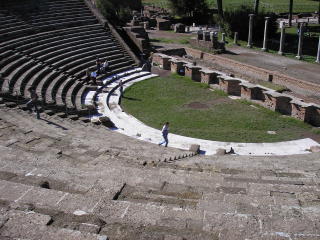 Another shot of the theater, which originally had 3 tiers of seating divided into five cunei (wedges) and a seating capacity of around 2,700; two of the tiers survive
Another shot of the theater, which originally had 3 tiers of seating divided into five cunei (wedges) and a seating capacity of around 2,700; two of the tiers survive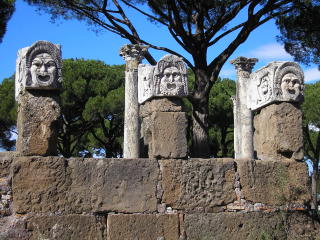 Theater masks
Theater masks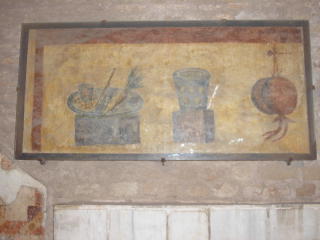 A painting of fruits and vegetables from a Thermopolium, which is very well preserved. The marble countertops are in excellent shape, and two seats flanking the door also survive
A painting of fruits and vegetables from a Thermopolium, which is very well preserved. The marble countertops are in excellent shape, and two seats flanking the door also survive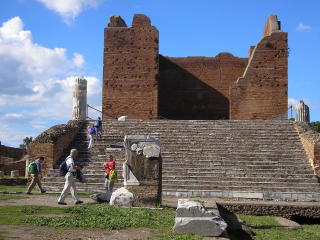 The Capitolium in the Forum. The temple was dedicated to the Capitoline triad (Jupiter, Juno, and Minerva)
The Capitolium in the Forum. The temple was dedicated to the Capitoline triad (Jupiter, Juno, and Minerva)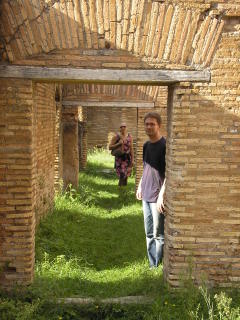 My wife Allison and brother Ryan in the doorways of some buildings on one of Ostia's side streets
My wife Allison and brother Ryan in the doorways of some buildings on one of Ostia's side streets Via Ostiense
Via Ostiense Porta Romana
Porta Romana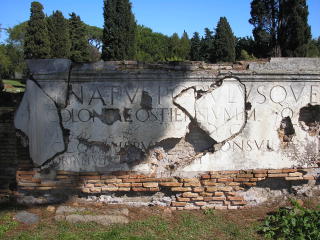 Fragments of the inscription once adorning Porta Romana. Notice 'P. Clodius...', and I believe the 'M' may be from Marcus Tullius Cicero
Fragments of the inscription once adorning Porta Romana. Notice 'P. Clodius...', and I believe the 'M' may be from Marcus Tullius Cicero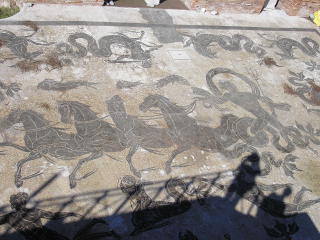 Neptune mosaic from baths
Neptune mosaic from baths Theater
Theater